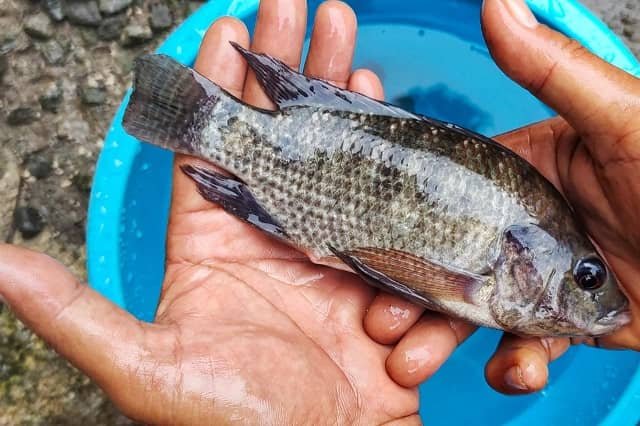
Probiotics have become a crucial ally for fish farmers as they boost growth performance, feed utilization, immunity, and disease resistance. Numerous studies highlight their positive effects, especially in fish such as tilapia.
A common practice is incorporating probiotics into processed feeds. However, the viability of these microorganisms can be affected by food processing techniques, storage, and the gastrointestinal transit of ingested food.
Researchers from the University of São Paulo (USP) and the State University of Campinas (UNICAMP) studied the effects of free and spray-dried Bacillus subtilis (BS) on oat β-glucan microcapsules regarding growth performance, hematology, intestinal microbiota, histology, and immunity in Nile tilapia, Oreochromis niloticus.
This study explores a promising solution: microencapsulating the probiotic Bacillus subtilis in oat β-glucan, leading to significant improvements in tilapia health and performance.
The Challenge: Probiotics Under Siege
Probiotics are live microorganisms, usually bacteria or yeast, that confer health benefits to the host and contribute to environmental impact reduction through bioremediation and biocontrol mechanisms.
Currently, a wide range of microorganisms such as Bacillus, Lactobacillus, and Pseudomonas are used in aquaculture. Adding probiotics to fish feed has immense potential as it promotes intestinal health, digestion, and immunity. However, conventional feed processing and the fish’s acidic intestinal conditions can significantly reduce probiotic viability, hindering their beneficial effects.
The Solution: A Protective Layer of Oat β-Glucan
Researchers investigated the effect of microencapsulated B. subtilis in Nile tilapia compared to free bacteria (unprotected) and a control group. Innovative microcapsules used oat β-glucan, a natural fiber, to create a protective shield around the probiotic, potentially increasing its survival throughout the digestive process.
Notable Results: Increased Growth and Intestinal Health
The findings were impressive:
- Tilapia fed with microencapsulated B. subtilis (SM diet at 0.2%) exhibited the highest growth rate and feed utilization, translating to greater efficiency and potentially higher yields in aquaculture.
- Intestinal villi, finger-like structures responsible for nutrient absorption, were longer and thicker in fish receiving both free and microencapsulated probiotics. This indicates improved intestinal health and better nutrient absorption.
- No significant differences were observed in hematological parameters, suggesting no adverse effects on overall health.
- Phagocytic activity, a key immune function, significantly improved in fish fed with 0.2% S and 0.2% SM diets. This implies greater resistance to pathogens and potential disease tolerance.
- The dominant phyla in tilapia were Fusobacteriota, Firmicutes, and Bacteroidota, constituting over 90% of the intestinal microbiota.
Conclusion
The scientists conclude that microencapsulation has the potential to protect B. subtilis and could be a valuable approach to enhance the viability of probiotics as additives in fish feed.
Stay Always Informed
Join our communities to instantly receive the most important news, reports, and analysis from the aquaculture industry.
This study paves the way for broader adoption of microencapsulation technology in fish feed. By safeguarding probiotics like B. subtilis, we can unlock their full potential to improve tilapia growth, intestinal health, and overall well-being, leading to a more sustainable and productive aquaculture industry.
Probiotics, along with prebiotics and synbiotics, offer viable alternatives for fish farmers to ensure the health of their fish. The study provides an alternative to enhance the utilization of probiotics.
The study was funded by the “Fundação de Amparo à Pesquisa do Estado de São Paulo” (FAPESP) and the “Coordenação de Aperfeiçoamento de Pessoal de Nível Superior” (CAPES).
Contact
Angélica Priscila do Carmo Alves
Aquaculture Sector, Department of Animal Science, Luiz de Queiroz College of Agriculture (ESALQ)
University of São Paulo (USP)
Piracicaba, SP, Brazil
Email: apcalves@alumni.usp.br
Reference
do Carmo Alves, A.P., Orlando, T.M., de Oliveira, I.M. et al. Synbiotic microcapsules of Bacillus subtilis and oat β-glucan on the growth, microbiota, and immunity of Nile tilapia. Aquacult Int (2023). https://doi.org/10.1007/s10499-023-01355-6
Editor at the digital magazine AquaHoy. He holds a degree in Aquaculture Biology from the National University of Santa (UNS) and a Master’s degree in Science and Innovation Management from the Polytechnic University of Valencia, with postgraduate diplomas in Business Innovation and Innovation Management. He possesses extensive experience in the aquaculture and fisheries sector, having led the Fisheries Innovation Unit of the National Program for Innovation in Fisheries and Aquaculture (PNIPA). He has served as a senior consultant in technology watch, an innovation project formulator and advisor, and a lecturer at UNS. He is a member of the Peruvian College of Biologists and was recognized by the World Aquaculture Society (WAS) in 2016 for his contribution to aquaculture.







